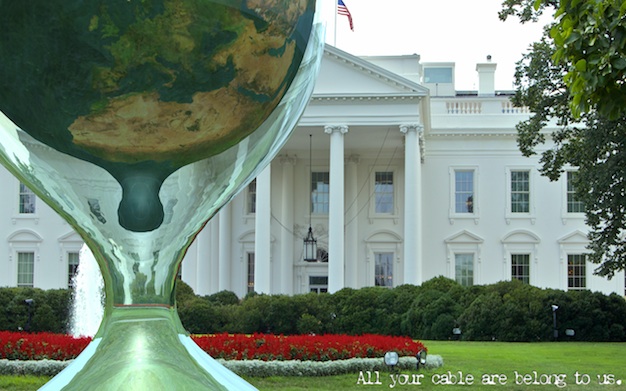 The Guardian: A guide to Gaddafi's 'famously fractious' family
The Guardian: A guide to Gaddafi's 'famously fractious' family
"US embassy cables shed light on Gaddafi family – including son Saif al-Islam, who vowed in TV address to eradicate enemies.
The leader of the Libyan revolution presides over a "famously fractious" family that is powerful, wealthy, dysfunctional and marked by internecine struggles, according to US diplomatic cables released by WikiLeaks. The documents shed light on how his eight children – among whom rivalries have sharpened in recent years – his wife and Gaddafi himself lead their lives."
Aftenposten: SECURING ADDITIONAL ALLIED/PARTNER CONTRIBUTIONS TO ISAF IN SUPPORT OF PRESIDENT OBAMA"S UPCOMING ANNOUNCEMENT ON AFGHANISTAN
"When President Obama announces his decision on possible U.S. troop increases for Afghanistan, the impact could be far greater if other Allied and Partner leaders would announce increases of their own either simultaneously or in close succession. Several Allies and Partners have the military capacity to make significant additional contributions, and if they showed the political will to follow through that would send a strong signal of resolve and unity of purpose to the international audience, Al Qaeda and the Taliban. We should use the time between now and the Presidents announcement to engage select Allies and Partners at the highest levels to secure commitments to those additional military, civilian and monetary contributions. Below is a summary of nations that we believe can do more now. Of these countries, we believe Germany, Italy, and the UK are the most likely to respond positively."
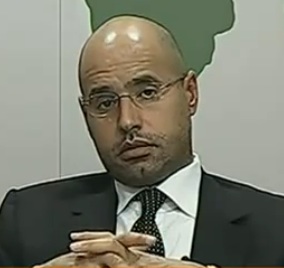 An address from Muammar al-Gaddafi’s son, Saif al-Islam al-Gaddafi, was aired on television in Libya early on February 21. Saif al-Islam told Libyans he had come without a prepared speech and was going to speak from his heart and mind.
An address from Muammar al-Gaddafi’s son, Saif al-Islam al-Gaddafi, was aired on television in Libya early on February 21. Saif al-Islam told Libyans he had come without a prepared speech and was going to speak from his heart and mind.
The address (which you can read here) was given as Tripoli was turning into more of a battlefield. Snipers were firing in Saha Al Khadra. His father’s “thugs” were allegedly going into hospitals and killing Libyans who had been out in the streets and been wounded.
Rumors are circulating that Saif al-Islam was shot. Some of the unconfirmed reports say Saif al-Islam is dead and his father and some from the Gaddafi family has fled. Muammar has gone to Venezuela, some reports allege.
The death of Saif al-Islam is possible, but until there are reports which go beyond unconfirmed, this is largely a distracting story. What Saif al-Islam said in the recorded address that aired on February 20 is much more important.
Saif's Address to Libya

The third episode of this weekly podcast, which looks at stories related to WikiLeaks from the past week, featured guest Michael K. Busch, who teaches international relations at the City College of New York, where he is also program coordinator at the Colin Powell Center for Policy Studies. He has posted on blogs on released cables on WikiBlogged, and he is listed as a resource in the back of Greg Mitchell's recently published book, "Age of WikiLeaks," which you can purchase in print on Blurb.com or in e-book form off of Amazon. [Follow him on Twitter @michaelkbusch]
The program for this week's show was dedicated to protests and violence in the Middle East and North Africa (MENA). The show will provide updates on what is happening in the region and discuss some released WikiLeaks cables that provide context for what is happening.
Muammar al-Gaddafi came to power in Libya on the 1st of September 1969 through a military coup which proclaimed the Libyan Arab Republic. Now he is the longest serving national leader that does not belong to a royal family. His stance on international affairs has mostly been conflictive and aggressive in nature, although after a long list of disputes, such as financing terrorism worldwide or military clashes with the U.S., he moderated his policies seeking collaboration with international corporations, especially with the Bush Administration.
In the early years of his regime Gadaffi set up a system based on what he called Islamic socialism. In practice this meant a system based on popular or direct democracy, where the population would be organized in communes or popular councils so as to personally elect their leaders. The state was built upon these units and controlled the larger companies, leaving the small ones for private ownership. In 1975 he started publishing a recollection of his philosophy in what he named the "Green Book", where he called the system in Libya the Third International Theory, a third way in between capitalism and communism. He also called his form of government Jamahiriya (a term coined by him), often translated as “republic of the masses”, thus officially making Libya the Great Socialist People's Libyan Arab Jamahiriya. After some years Gaddafi stepped down from his leading position in the General Peoples Committee (the ruling governmental organ) and is now considered a spiritual guide under the title of “Brotherly Leader and Guide of the Revolution".
The world watches in horror as peaceful protesters particularly in Libya and Bahrain (but also in Iraq and elsewhere) are attacked by police or military forces using live ammunition. Even worse, in Bahrain, firstly at the Pearl Roundabout, not only did those armed forces prevent many injured from being removed from the streets for medical attention, they beat up the paramedics attempting to remove those injured. Here are graphic videos at Wikileaks Central the first of which is another Bahrani incident, (horrific scenes of dead and dying).
There are other incidents not necessarily confirmed but wholly consistent with orders for security forces to use extreme force and deny medical attention to the wounded, including removing the injured from hospital.
In Libya, Human Rights Watch reports at least 84 dead in several cities:
Two days ahead of calls to protest the Gaddafi regime in a “Day of Rage” on February 17, members of the Committee of the Families of the Victims of the Abu Salim Massacre came out to protest. Libyan attorney and human rights activist Fathi Terbil, who represents families that had family members massacred in mass prison killings that took place at the Abu Salim prison in 1996, was arrested. Terbil’s arrest led to an eruption of protests ahead of the planned “Day of Rage.”
Protesters showed up to the police headquarters in the city of Benghazi to demand his release. The crowd outside swelled to somewhere between one and two thousand. This response demonstrated how the Gaddafi’s refusal to prosecute those responsible for the massacre of nearly 1200 prisoners in over a decade ago has created a deep resentment among Libyans toward the regime.
The arrest was an example of how the Gaddafi regime treats “regime critics” or dissidents.
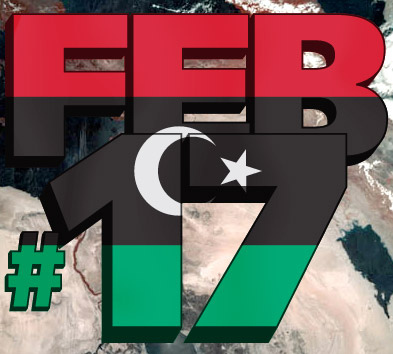 *Author's note: Previously, it had been mentioned that a Part 2 of a feature story titled "WikiLeaks Vindicates Those Behind Unfolding Revolutions" would run before the week was over. Publication has been postponed so proper coverage of cables and news related to Yemen, Algeria, Libya, Bahrain, Iran, Iraq, etc can be focused on instead.
*Author's note: Previously, it had been mentioned that a Part 2 of a feature story titled "WikiLeaks Vindicates Those Behind Unfolding Revolutions" would run before the week was over. Publication has been postponed so proper coverage of cables and news related to Yemen, Algeria, Libya, Bahrain, Iran, Iraq, etc can be focused on instead.
Libyans are mobilizing for a “Day of Rage” today on February 17. Protesters in the early afternoon, according to a member of the Libyan Youth Movement, were reported to be moving to the Security Headquarters in Benghazi. The protests are said to be gaining numbers and are headed for Maydan al Shajara once more, a location that had been the site of gunfire and petrol bombs.
The same individual also reports shortages of medical supplies at Al Bayda hospital and urges international health organizations to help out. And the movement member shared reports of people in Benghazi managed to chase away “pro-government Gaddafi thugs” by throwing rocks at them.
Many in Libya believe ahead of the “Day of Rage” that the Gaddafi regime was planning to threaten Libyans with live fire and the targeting of family members if they participated in anti-government protests. Also, it was reported that Gaddafi was having government employees go protest at pro-Gaddafi rallies, and, if they refused, they would be fired.
Cables released on Libya provide context for the protests that are unfolding. 09TRIPOLI192 from February 2009 titled, “For Ordinary Libyans, It’s the Economy Stupid,” breaks down what might be frustrating Libyans and why Egypt may have been just what they needed to be inspired to take action. The cable suggests Libyans are more interested in economic democracy, not political democracy:
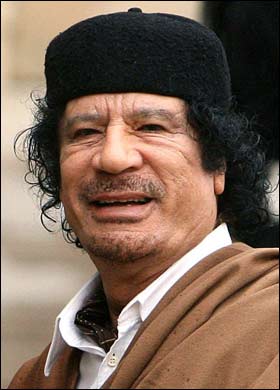 In Libya, the Revolution (Al-Thawra) refers not to the protests happening today, but to the revolution over 41 years ago which installed Brotherly Leader and Guide of the Revolution Muammar al-Gaddafi in power. The National Conference for the Libyan Opposition (NCLO) and Libyan activists are calling for a Libyan Day of Rage on February 17 against the abuses of 'the Revolution'. The NCLO has called for mass protests both in and outside of Libya to fall on the anniversary of the February 17, 2006 mass demonstrations in Benghazi against Gaddafi and his regime, which resulted in the deaths of dozens of protestors and the injury of many more.
In Libya, the Revolution (Al-Thawra) refers not to the protests happening today, but to the revolution over 41 years ago which installed Brotherly Leader and Guide of the Revolution Muammar al-Gaddafi in power. The National Conference for the Libyan Opposition (NCLO) and Libyan activists are calling for a Libyan Day of Rage on February 17 against the abuses of 'the Revolution'. The NCLO has called for mass protests both in and outside of Libya to fall on the anniversary of the February 17, 2006 mass demonstrations in Benghazi against Gaddafi and his regime, which resulted in the deaths of dozens of protestors and the injury of many more.
Gaddafi issued the first official response in private meetings over the last few days with Libyan political activists, journalists, and media figures. He issued severe warnings that they and their professions would be held responsible should they participate in any way in "disturbing the peace or creating chaos" in Libya. WL Central coverage of recent protests told of the fears which were sparked in Gaddafi by the Tunisian revolution. Gaddafi has spoken out against the revolution in Tunisia, and blamed the internet and Al Jazeera news for spreading 'lies' against former Tunisian president Ben Ali. He has also defended Egyptian president Mubarak, saying that the Mubarak family, estimated to be worth US$70 billion, is poor and cannot afford their clothes. He said that Libya is providing the Mubarak family with financial support and accused Israeli intelligence of instigating the Egyptian revolution.
 The Telegraph: Suleiman told Israel he would 'cleanse' Sinai of arms runners to Gaza
The Telegraph: Suleiman told Israel he would 'cleanse' Sinai of arms runners to Gaza
"Omar Suleiman, the new vice-president of Egypt, told the Israelis he wanted to start “cleansing the Sinai” of Palestinian arms smugglers, according to leaked cables."
The Telegraph: Egyptian 'torturers' trained by FBI
"The US provided officers from the Egyptian secret police with training at the FBI, despite allegations that they routinely tortured detainees and suppressed political opposition."
The Telegraph: Mohamed ElBaradei was 'too soft on Tehran’
"The United States and Israel warned that Mohamed ElBaradei, a key leader of the Egyptian opposition, was soft on Iran and was becoming “part of the problem” in the Middle East, according to leaked diplomatic cables."
The Telegraph: Hosni Mubarak told US not to topple Saddam Hussein
"Hosni Mubarak told Dick Cheney, the former US vice-president, “three or four times” not to depose Saddam Hussein, according to leaked cables."
El País: Frei, un perdedor con cara de perdedor (Frei, a loser with the face of a loser)
Map via @Houeida Anouar
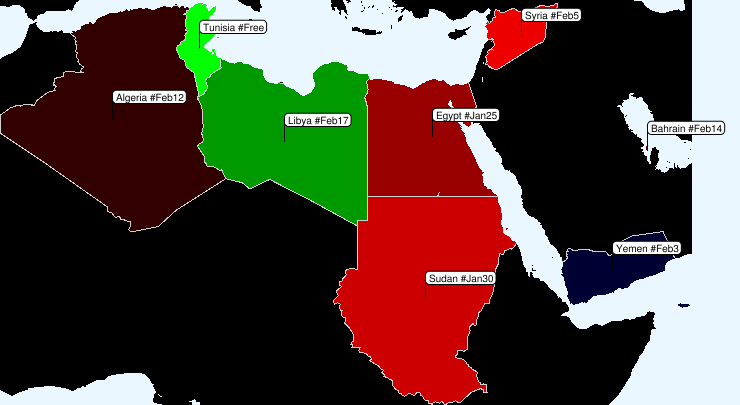
Tunisia December 15:
2011-02-01 Tunisian Islamic Leader Returns as EU Freezes Ousted President's Assets
2011-01-27 Tunisia protests continue as a warrant is issued for Ben Ali
2011-01-24 Tunisia today: "It’s not a unity government, it’s a fake unity government”
The Telegraph: FBI hunts the 9/11 gang that got away
"The FBI has launched a manhunt for a previously unknown team of men suspected to be part of the 9/11 attacks, the Daily Telegraph can disclose."
The Telegraph: 9/11 gang with pilot uniforms fled to London
"Even before three men of Middle Eastern appearance had told cleaners to stay out of their room, staff at a Los Angeles airport hotel had become increasingly suspicious of what they were up to."
The Telegraph: Libyan 'frogman' sent to train in Rome couldn't swim
"In Libya, where corruption and nepotism are often stitched into the fabric of society, it is often not a case of what you know, but who you know."
The Telegraph: WikiLeaks files reveal 'cold, callous and brutal' behaviour of ministers
"A mother who lost her daughter in the Lockerbie attack has condemned the “cold, callous and brutal” behaviour of British ministers after WikiLeaks documents revealed how they secretly advised Libya on securing the successful early release of the bomber."
The Telegraph: Libya insists ball in U.S. court on scud B alternative
US State Department cables released on Monday by the Telegraph (London) and WikiLeaks reveal that, in September 2009, in response to a perceived insult to President Muammar al-Qadhafi from the Canadian government, the Libyan National Oil Company threatened to nationalize the local assets of Petro-Canada, then a Canadian Crown corporation. The cables tie the diplomatic row to Foreign Affairs Minister Lawrence Cannon's threat to give al-Qadhafi a "public tongue-lashing" over his reception of Abdel Bassett al-Megrahi, whose conviction in the case of the Pan Am 103/Lockerbie bombing and recent release from prison had both been controversial.
09TRIPOLI770
09TRIPOLI825
09TRIPOLI867
The US ambassador notes the general concerns that Libya's successive threats to Petro-Can had raised in the international community:
Libya's Moamer Gaddafi may have hailed WikiLeaks for exposing US 'hypocrisy' back in December but since the cablegate exposures helped rally the people to throw out Ben Ali in January, he has been singing a different tune. Yesterday Gaddafi "said he feared that the Tunisian revolution which overthrew president Zine al-Abidine Ben Ali was being exploited by 'foreign interests'" according to France24. In an interview, he told the private Tunisian Nessma TV station “I fear for the Tunisian revolution."
"The lesson from what's happening in Tunisia is that (Arab leaders) won't be able to hide any more behind the Islamist threat argument."
-Amel Boubekeur
If Tunisians are protesting for freedom, not religion, what role did Wikileaks and online social networks play in mobilizing Arab populations to throw off the shackles of authoritarian, repressive, and corrupt regimes? Are our western institutions responsible for the waves of protest threatening to drown capitals in the Middle East?.
EA World View is reporting protests in Darna on the northeast coast of Libya, in Beida, the third-largest city, and at the Press Syndicate in Cairo, supporting the rising in Tunisia and calling for a change in Egypt's politics: "Revolution, revolution until victory, revolution in Tunisia, and revolution in Egypt!"
More news is appearing under the hashtag #Libya including the following:
This Day in Cable History. (May 12th 1986. Madrid)
QADHAFI RETALIATES AGAINST SPANISH EXPULSIONS.LIBYA MAY 12 RESPONDED TO FRIDAY'S EXPULSION OF ITS CONSUL GENERAL, CHARGED WITH PASSING FUNDS TO A SPANISH ARMY COLONEL ON THE ANTI-DEMOCRATIC RIGHT, BY PNG'ING THE SPANISH COMMERCIAL AND CULTURAL COUNSELORS IN TRIPOLI. MFA'S SUBDIRECTOR GENERAL FOR NORTH AFRICA TELLS US THAT THE GOS WILL NOT RETALIATE SPECIFICALLY FOR THESE EXPULSIONS; AS INVESTIGATIONS CONTINUE INTO THE LIBYAN ACTIVITIES HERE, HOWEVER, MORE EXPULSIONS ARE QUITE POSSIBLE.
This Cable, written on a Monday afternoon in 1986 describes some of the "realpolitik" between Spain and Libya at the time. Further, this cable was written 27 days after the United States bombed Tripoli and surrounding military bases. Though QADHAFI and his administration were not an innocent party to the events leading up to the raid; the raid-bombing itself was condemned by many countries.
By a vote of 79 in favor to 28 against with 33 abstentions:
The Guardian: WikiLeaks cables: Consult us before using intelligence to commit war crimes, US tells Uganda
"The US told Uganda to let it know when the army was going to commit war crimes using American intelligence – but did not try to dissuade it from doing so, the US embassy cables suggest.
America was supporting the Ugandan government in its fight against rebel movement the Lord's Resistance Army (LRA), providing information and $4.4m (£2.8m) worth of military hardware a year.[...]
[US Ambassador Jerry] Lanier continued: "Uganda understands the need to consult with the US in advance if the [Ugandan army] intends to use US-supplied intelligence to engage in operations not government [sic] by the law of armed conflict. Uganda understands and acknowledges that misuse of this intelligence could cause the US to end this intelligence sharing relationship."
Nowhere, though, does it appear that the ambassador directly told the Ugandans to observe the rules of war."
Read more
The Guardian: WikiLeaks cables: Shell's grip on Nigerian state revealed
"The oil giant Shell claimed it had inserted staff into all the main ministries of the Nigerian government, giving it access to politicians' every move in the oil-rich Niger Delta, according to a leaked US diplomatic cable.
The company's top executive in Nigeria told US diplomats that Shell had seconded employees to every relevant department and so knew "everything that was being done in those ministries". She boasted that the Nigerian government had "forgotten" about the extent of Shell's infiltration and was unaware of how much the company knew about its deliberations."
Read more
Theme by Danetsoft and Danang Probo Sayekti inspired by Maksimer